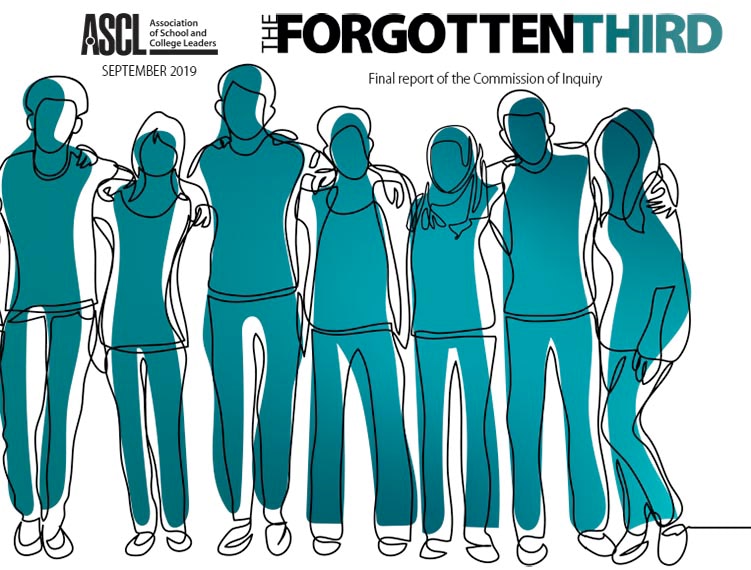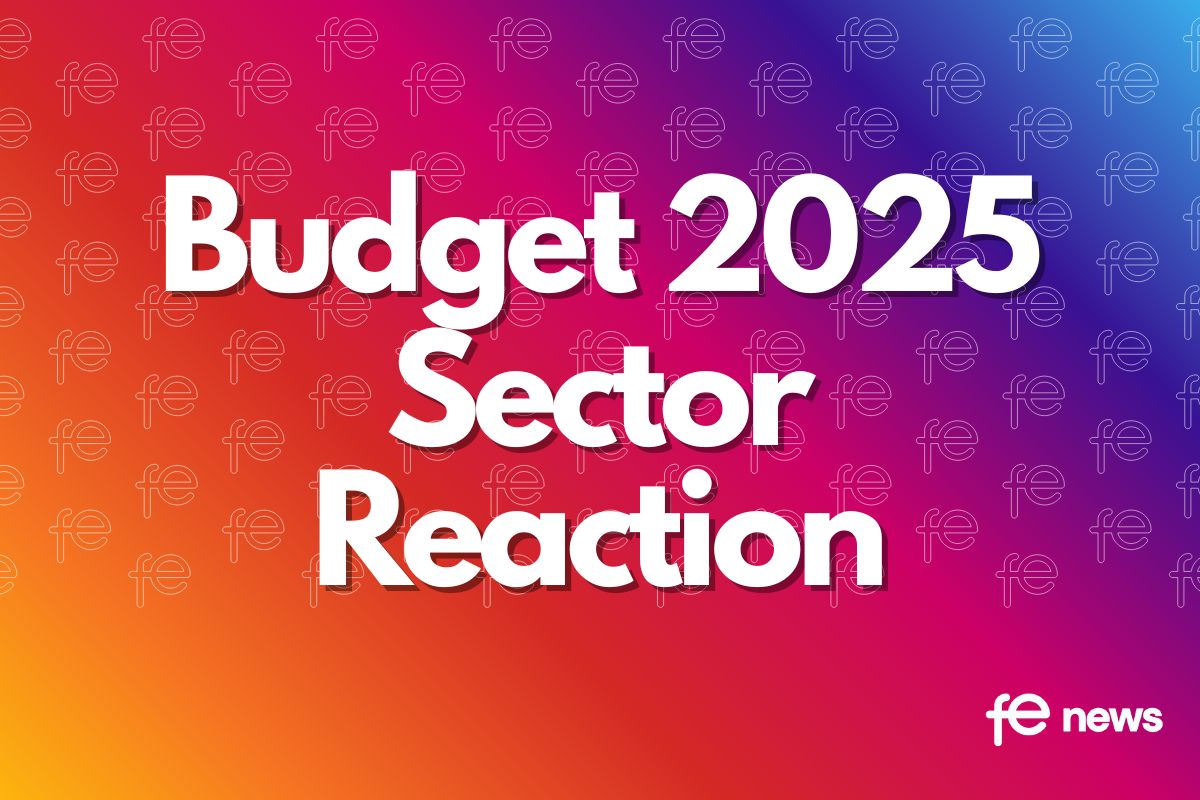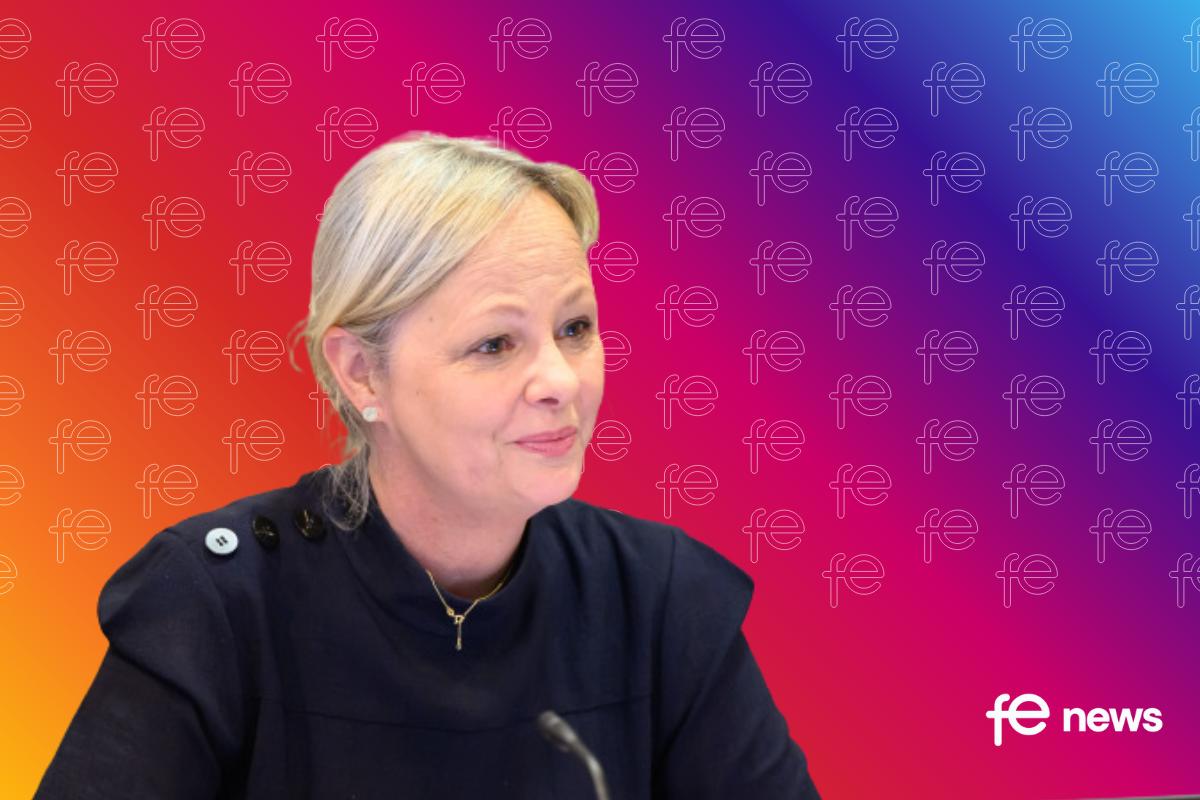Forgotten Third Commission recommends scrapping GCSE English Language

Today (11 Sept) the final report from the Forgotten Third Commission recommends GCSE English Language should be replaced with a new qualification called a ‘Passport in English’ among other notable reforms to educational assessment.
GCSE English Language should be replaced with a new qualification called a Passport in English in order to end the misery of an exam system which condemns more than a third of 16-year-olds to a sense of failure every year, according to a Commission of Inquiry established by the Association of School and College Leaders (ASCL).
ASCL launched the Commission last October into how to improve the prospects of the ‘forgotten third’ of students who fall short of achieving at least grade 4 in both GCSE English and maths.
These qualifications are widely seen as vital to onward progression to further and higher education courses and careers.
However, the exam system currently consigns just over a third of students to falling below this bar every year because of a mechanism called ‘comparable outcomes’ under which the distribution of GCSE grades is determined largely by how similar cohorts have performed in the past.
In 2018, more than 187,000 students fell short of what the government describes as a ‘standard pass’ in English and maths after 12 years of schooling, and this massive rate of attrition is destined to repeat itself year after year unless action is taken to change the system.
Today (11 Sept), the Forgotten Third Commission, which is chaired by educationist Roy Blatchford, delivers its final report with a series of recommendations aimed both at improving the learning of English language and making the exam system work better for students and employers.
It concludes that the current GCSE English Language specification is not fit for purpose because it focuses on a restrictive choice of writing tasks with an emphasis on literary analysis, rather than on competency in English.
Its key recommendation is to replace this qualification with a Passport in English which would be taken by all students at the point of readiness of the student and could be built on over time at different levels between the ages of 15 and 19. It would focus on competency in the everyday English skills sought by employers and would comprise online assessment, a portfolio of a student’s writing, and a significant spoken English component.
It would also end the wasteful GCSE resit industry in which many students who fall short of a grade 4 in English and/or maths at the end of school are currently required to retake these subjects in post-16 education with many failing to improve their grades2.
The Commission looked at English in the first instance, but recommends similar consideration be given to a companion Passport in Maths.
It also recommends that the government should stop using the unhelpful terminology of a ‘standard pass’ to describe a GCSE grade 4 and a ‘strong pass’ to describe a GCSE grade 5 because of the demoralising effect that these descriptions have on students who fall short of these grades.
And it recommends that a new approach to primary assessment should be developed to replace Key Stage 2 SATs in order to address the fact that the intense focus on English and maths in these high-stakes tests can drive an over-emphasis on these subjects in primary schools at the expense of the broader curriculum.
Commission chair Roy Blatchford said:
“It cannot be right or sensible that we continue to operate a system that is designed to ‘fail’ one-third of young people every year in order that two-thirds succeed. The third who we consign to this fate are left utterly dejected and with reduced chances for progression in education and careers.
“A good command of English language is the key to understanding and accessing every other subject in the curriculum, and to confidence in society and the workplace in general. We must do more to ensure that every young person has good literacy skills and to recognise their achievements through a robust qualification which supports students to develop their level of competency rather than acting as a cliff edge.”
ASCL General Secretary Geoff Barton said:
“The Commission’s recommendation for a Passport in English is a groundbreaking proposal to make our exam system a more humane and supportive experience which better reflects the optimistic, modern and forward-thinking nation we need to be. It would allow every young person the dignity of achieving a qualification of which they can be proud.
“We hope policymakers will greet this proposal with an open mind and not resort to the tired old argument that GCSE represents a gold standard and anything else is a form of dumbing down. The Passport in English would be a rigorous qualification, which builds achievement, and is geared towards the language skills needed by employers instead of examining young people on their ability to analyse historic texts.
“Our thanks to Roy Blatchford and the Commission on their outstanding work in producing their final report and recommendations.”
David Hughes, Chief Executive of the Association of Colleges, said:
“The Forgotten Third report shows that the failure, every year, of one-third of GCSE English students to achieve at least a grade 4 is avoidable. The current system is demoralising and fails far too many young people at a crucial time in their lives. With the introduction of a Passport in English we could raise the life chances and progression opportunities for so many 16 to 18 year olds. The premise is a simple one – stage not age should determine a student’s ability to gain a qualification.
“It is pointless that the education system currently writes off so many young people because they do not get a grade 4 in English at 16, compounded by a failing resit policy. The current route is too linear for a subject so vital to the workplace and society. We need government and policy makers to seriously consider the detailed recommendations for a reformed qualification that builds on skills and individual needs. Far from weakening the assessment process or making the qualification easier as many proposed reforms have been accused of, the Passport in English – and maths – presents a workable solution to ensure no young person is left behind.”
The Forgotten Third
Department for Education statistics show that 35.8% of pupils in all state-funded schools in England failed to achieve at least a grade 4 in both English and maths at the end of key stage 4 in 2018. This equates to 187,458 pupils. (Key stage 4 and multi-academy trust performance 2018 (revised), table 2a). The statistic relates to performance in either English language or English literature and maths.
Equivalent statistics for 2019 have not yet been published but results for English language, English literature, and maths published by the Joint Council for Qualifications (JCQ) in August show a similar percentage of 16-year-olds in England failed to achieve at least a grade 4 in each subject separately as in 2018.
The percentage who did not attain a grade 4 or above in these subjects in 2019 was: English language (29.5%); English literature (25.9%), maths (28.5%). (Provisional GCSE (Full Course) Results – June 2019. GCSE England, Northern Ireland and Wales age breakdowns).
Students aged 16-18, and 19-25 with an education, health and care plan, must study maths and/or English as part of their programme in each academic year if they do not hold a GCSE grade 9-4/ A*-C in these subjects. Students with a grade 2 or below in maths or English can study functional skills or GCSE. Students with a grade 3 must study GCSE. (16-19 funding: maths and English condition of funding. Education Skills and Funding Agency).
In 2019, JCQ results for the summer series of exams showed the percentage of students aged 17 and over in England who failed to achieve a grade 4 or above in GCSE English language was 69.7% and in GCSE maths it was 78.8%.











Responses